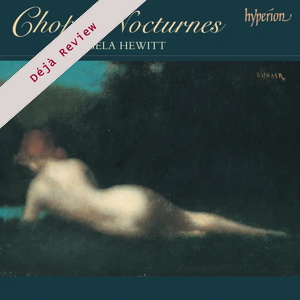
Déjà Review: this review was first published in April 2005 and the recording is still available.
Frédéric Chopin (1810-1849)
Nocturnes
Angela Hewitt (piano)
rec. 2003, Reitstadel, Neumarkt in der Oberpfalz, Germany
Hyperion CDA67371/2 [2 CDs: 133]
Angela Hewitt, one of the elite Bach pianists of her generation, has also shown quite an affinity with the modern French school. And lest one thinks that she avoids the taxing bravura showpieces of the nineteenth century powerhouse literature it should be noted that she has Liszt’s B minor sonata in her active repertoire. Given such associations and affiliations it’s no surprise that in her series of recordings for Hyperion she has now turned to Chopin and to the Nocturnes in particular. She gives us them all, adding for good measure, the four Impromptus.
She’s a Chopin player of decided viewpoints. Tonally she is special, and one feels throughout a constant admiration for the subtlety of touch and warm lyricism that animates all these works. She’s seemingly incapable of an ugly ill-tuned sound, and of technical weakness there are few signs. Her approach is consistent and attractive and her analysis of the peaks and flow of the rhetoric consistently alert. And yet there are those decided viewpoints to consider. Some are small and may not concern many people, or often. But why does she add the ornamental variations to Op.9 No.2 seemingly passed down to posterity by a Chopin student? It may be the case that Chopin wrote them in a student’s copy but when Hewitt cites sticking to the extant metronome markings for Opp. 9, 15 and 27 in an attempt at ridding them of excessive lethargy one might ask whether a student’s copy of some ornamentations are quite the thing to be invoking. This is puzzling because one of the features one notices is recurrent use of rubati – the Op. Posth. C sharp minor is a decisive case in point which, for all its naturally pliant expression, does sound rather forced. So for that matter does the D flat major Op.27 No.1, which starts surprisingly slowly. Naturally I think the successes outweigh the more contentious matters of dichotomous speed, questionable rubati (it’s not the rubati one questions, obviously, but their application) and such matters of emendations to the score as noted above.
On the merit side – a big merit – the C sharp minor Op.27 No.1 is beautifully played with its mystery intact, and the A flat major Op.32 No.2 is truly poetic; one admires as well the gravity of the bass line in the G minor (Op.37 No.1). I can appreciate however that she wishes to maximise the contrasts in the C minor, Op.48 No.1, but I think some will feel, as I do, that the contrasts here are just too explicit and the last note takes an age to die in a way I find sentimental. Similarly the B major Op.62 No.2 doesn’t sound altogether convincing; it loses direction then suffers form a kind of lassitude that doesn’t work musically. In Hewitt’s own very readable and entertaining notes she talks about the “resignation” implicit in the writing – but I have yet to reconcile myself to her realisation of it.
The Impromptus make a better, or at least more consistently successful impression. They don’t however really cover much expressive ground for all the beauty of tone and for all the considerable technical expertise on show. They’ve clearly been, like the Nocturnes, pondered long and hard; I’m sure others will find them more to their liking.
The sound quality extracted from the unusual location – at least for this company – of the Reitstadel, Neumarkt in der Oberpfalz is typically sensitive and warm without any blurring.
Jonathan Woolf
Help us financially by purchasing from


Contents
Nocturne in C sharp minor, Op posth. [3’53]
Nocturne in C minor, Op posth. [2’46]
Nocturne in B flat minor, Op. 9, no. 1 [5’59]
Nocturne in E flat major, Op. 9, No. 2 [4’34]
Nocturne in B major, Op. 9, No. 3 [6’20]
Nocturne in F major, Oop. 15, No. 1 [4’47]
Nocturne in F sharp major, Op. 15, No. 2 [3’32]
Nocturne in G minor, Op. 15, No. 3 [3’34]
Nocturne in C sharp minor, Op. 27, No. 1 [5’41]
Nocturne in D flat major, Op. 27, No. 2 [6’05]
Nocturne in B major, Op. 32, No. 1 [4’48]
Nocturne in A flat major, Op. 32, No. 2 [5’21]
Nocturne in G minor, Op. 37, No. 1 [6’18]
Nocturne in G major, Op. 37, No. 2 [4’57]
Nocturne in C minor, Op. 48, No. 1 [7’16]
Nocturne in F sharp minor, Op. 48, No. 2 [6’56]
Nocturne in F minor, Op. 55, No. 1 [4’38]
Nocturne in E flat major, Op. 55, No. 2 [4’57]
Nocturne in B major, Op. 62, No. 1 [7’29]
Nocturne in E major, Op. 62, No. 2 [6’09]
Nocturne in E minor, Op. 72, No. 1 [4’54]
Impromptu No. 1 in A flat major, Op. 29 [4’19]
Impromptu No. 2 in F sharp major, Op. 36 [6’20]
Impromptu No. 3 in G flat major, Op. 51 [5’48]
Fantaisie-Impromptu in C sharp minor, Op. 66 [5’22]

















